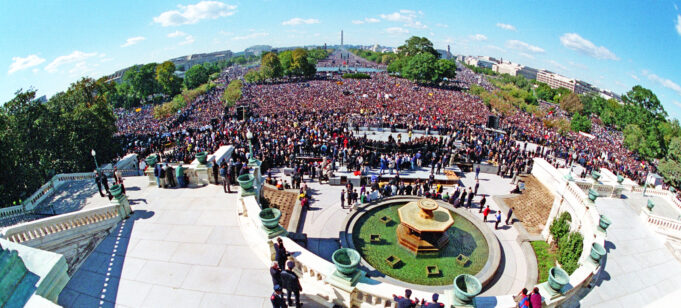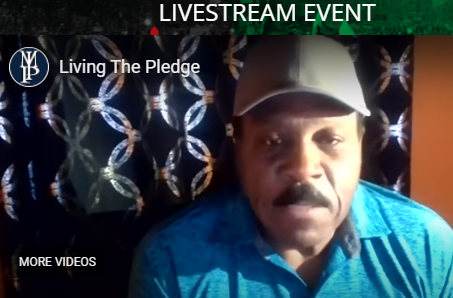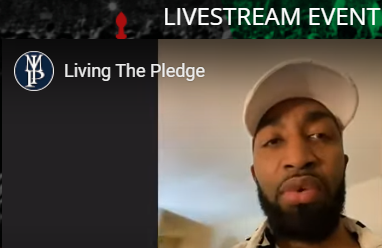The National African American Leadership Summit celebrated the 25th Anniversary of the Million Man March with three days of events that highlighted “Why We Marched,” “Organizing the March” and “Living the Pledge.”
“We did this March ourselves and what happened has never been documented properly,” said Rev. Mark Thompson who moderated each evening. The sessions were live-streamed on millionmanmarch25.com.
For viewers, each night was a stroll down memory lane and an intimate look at what happened behind the scenes of the largest gathering of Black men in history. The Honorable Minister Louis Farrakhan of the Nation of Islam called for a million men to come to Washington, D.C. with a theme of atonement, reconciliation, and responsibility. Nearly two million heard the call and responded on October 16, 1995. The three days of reflections aired October 14, 15, and 16 and included March organizers, supporters, and those impacted by the historic gathering.
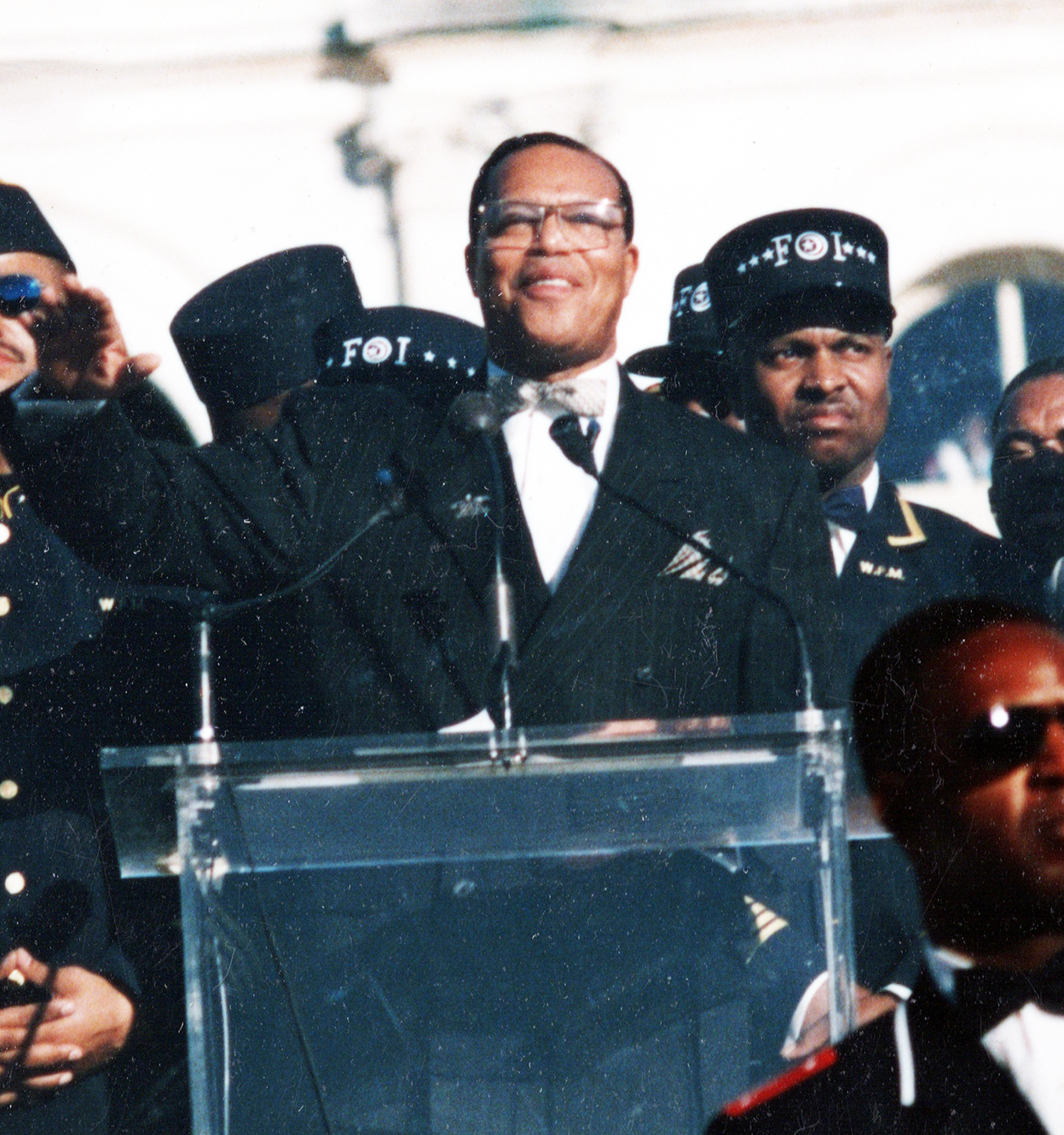
Min. Farrakhan was a surprise guest, October 16, on the program “Living the Pledge.”
“It was one of the finest examples of community help, leadership help and I don’t know who to single out except to say as the Qur’an always uses the soft pronoun we,” the Minister explained, speaking about the book of scripture of Muslims, the Holy Qur’an. “Who can say ‘I’ with such a magnificent example of the power of us. So, we say ‘we’ by God’s grace we gave the world a glimpse of what heaven looks like,” said Min. Farrakhan.
“God gave us a victory that day when Mayor (Marion) Barry closed down the city government, Congress, both houses closed down and the Supreme Court shut its doors. The president of the United States left the city to go to Austin, Texas, to deliver a speech on civil rights. The whole city was in the hands of Black men and women from early the night before to the end of the day on the 16th. Washington, D.C., the capital of the greatest nation in the history of the present world became the capital for Black America and we were in charge,” the Minister continued.
“There was only one arrest that day. We, who they looked at as savage, or uncivilized, the army was placed underground in case something crazy happened. The whole world became shocked at the level of civilization that we as a people displayed to show the entire world.”
Held on a Monday, the Million Man March was a day filled with love and affection for brotherhood and the Black family. It was one of the most diverse gatherings of Black organizations that represented the needs and concerns of every aspect of the Black community.
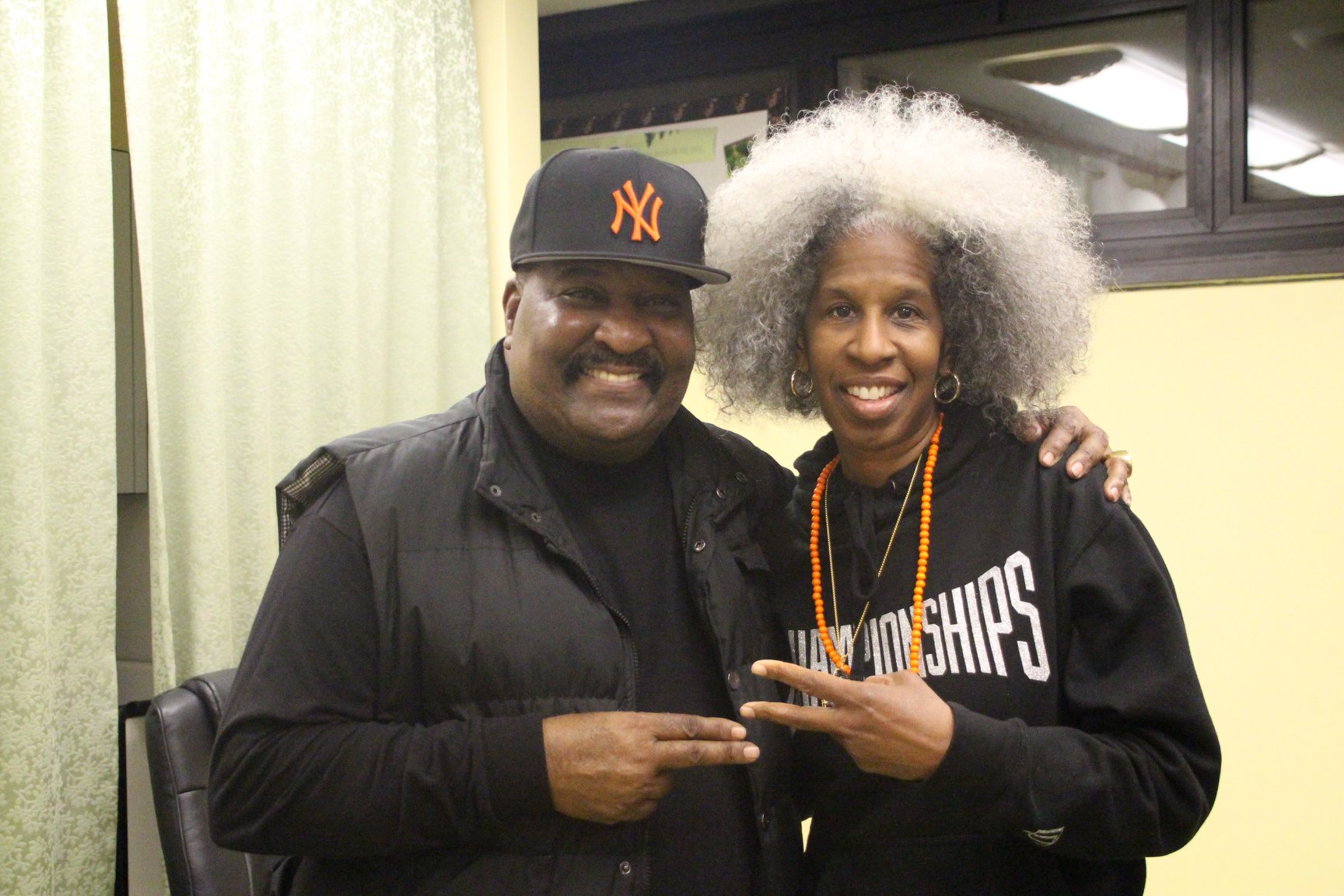
Unlike other marches, Blacks organized this march. It was held on a Monday, everyone had to pay their own way to D.C. and there were no corporate sponsors to filter what the speakers had to say. They were free to say what they wanted.
“The strength of the Million Man March (MMM) was in the local organizing committees known affectionately as the LOCs,” said Rev. Benjamin Chavis, Jr., National Director of the MMM. “There were over 300 and the sacrifice and courage of the national office of Phi Beta Sigma Fraternity also showed our strength. When we own our own institutions, we have the freedom to fight for freedom,” said Rev. Chavis, who today is president and CEO of the National Newspaper Publishers Association, the Black Press.
“The organizing for the MMM has never been before. We prayed and God answered our prayers. Organization takes structure. This took us reaching the diversity of our community,” he said. “I was the national director, but it took a dedicated staff to make this work.”
One of those dedicated staff members was oral historian Zaheer Ali. He was 22 at the time and came to D.C. to work on the March. He walked into the headquarters and was immediately put to work.
“We had to work to catch up to the spirit of Minister Farrakhan and the people,” he told the viewers. “It was really in the spirit of ‘Do for Self.’ This was bootstrap, lift yourself up kind of work knowing that we will win.”
Gradually we were able to catch up with the people’s enthusiasm, explained Mr. Ali. “This was grassroots organizing. The beauty was there was inspiration. We had to get out of the way of the people and co-power them not empower them because they were already empowered. We learned how to work with diverse groups of people. Special thanks to Minister Farrakhan for choosing Dr. Chavis for this job. As young people, we would not have had this opportunity were it not for him.”
The March was the culmination of a series of men’s only speeches by Min. Farrakhan. Masses of Black people became aware of the Muslim leader when he spoke at the 1983 commemoration of the 1963 March on Washington. The Washington Post reported on September 3, 1983, that his remarks, were “praised as perhaps the most significant and stirring of the day, according to march organizers and participants.”
So many were dumbfounded when the Minister was disinvited to the 1993 commemoration.
“The organizers bowed to pressures by not inviting Minister Farrakhan. The only way for a people to win their liberation and demands is through unity,” said Student Minister Ishmael Muhammad, national assistant to Minister Farrakhan and son of the Most Honorable Elijah Muhammad. “There were forces that worked against that unity,” Student Min. Ishmael Muhammad told viewers.
Dr. Chavis echoed that sentiment, “Not wanting to meet with your people isn’t natural. That’s the imposition from without. It’s the demonization of Black leaders.”
Minister Farrakhan announced the need for a Million Man March on January 24, 1994, in New York. The formal announcement of the March was given by the Minister in February 1995 at the annual Saviour’s Day celebration.
“After that, we went to work and we worked so hard,” said Student Min. Ishmael Muhammad. LOC’s also passed out flyers and put up posters in cities around the country. “Over 50,000 men came from Detroit,” he said.
“What made the March so successful was the people on the grassroots level made this happen. The leadership of the major faith denominations and organizations were not for it. What made it special was the nearly two million Black men who presented themselves in one space at one time for reconciliation and atonement,” added Student Min. Ishmael Muhammad.
The March’s goal was unity for the diversity of Black people. Min. Farrakhan explained how it was achieved in the months leading up to the march. “We came together, 80 preachers of every denomination you can think of marched into Rankin Chapel at Howard University and declared October 16, not a holiday, but a Holy Day of atonement, reconciliation, and responsibility and absence,” said the Minister.
“We didn’t go to school, work, or play. On that day, the Black man showed up in Washington, and peace, peace was the order of the day. We can do it. We can have a nation the likes of which they’ve never seen before because under the right spirit and the right guidance look what Allah allowed us to do.”
E. Faye Williams was director of the LOC in Washington, D.C., and was one of several Black women who were key organizers, contributors, and supporters of the Million Man March. It’s a myth that women were not involved or included. “I was so excited to come to the meetings. The brothers may have been in the streets, but the sisters were working in the suites. I will never forget it,” said Ms. Williams. Her job was to organize the men and women in D.C. to provide support services on the day of the March.
Dr. Ron Daniels of the Institute of the Black World 21st Century has a long and celebrated history of organizing. He was on the programming committee for the March. He told the audience, “I’m honored to be a part of this reflection. It’s emotional. It was a very emotional experience,” he said. “There’s no way we would create a plan to bring 1.5-2 million men to D.C., no way. This was a miracle,” said Dr. Daniels.
“God used Minister Farrakhan to bring this about, and he said repeatedly, ‘This is not about me. It’s about us.’ I was in 1963 at that march and I was on the balcony of the Capitol looking at the millions of men coming. We worked so hard day and night and there were still things that didn’t get done. On that morning when I heard that adhan (Muslim call to prayer), it pierced me. I was so moved.”
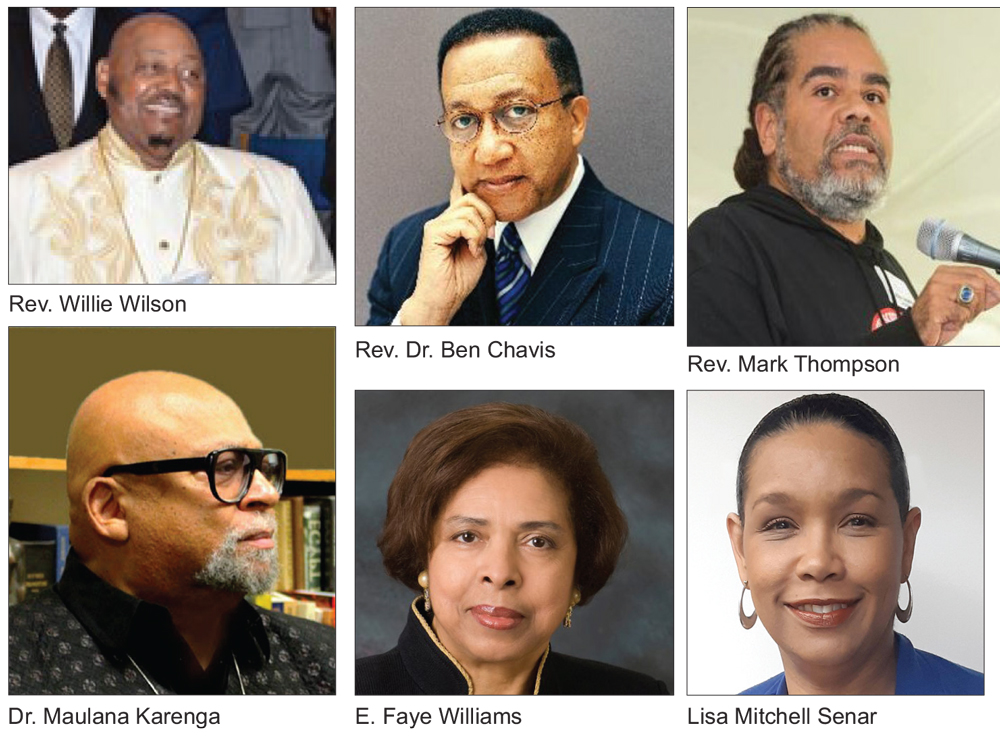
Another key to the success of the March was the Black media. From Min. Farrakhan and Rev. Chavis’ interview by Bev Smith on BET News to the repeated articles in the Black newspapers like the Afro American, the word was spreading and spreading fast.
Lisa Mitchell-Sennaar was the co-chair of the Baltimore LOC and a journalist. “Our voice through Black-owned media helped make the March a success. Thank you, Afro-American Newspaper. So many people worked to make this happen.”
While the speakers each night retold their stories, there was a constant theme of the need to duplicate that work and spirit for today. The line up for the three nights included Author, Dr. Michael Eric Dyson, Publisher Haki Madhubuti, Zac McDaniels, Spike Moss of Freedom Now, Erica Ford of Life Camp, Shanduke McPhatter of G-M.A.C.C (Gangstas Making Astronomical Community Changes Inc.), Wallace “Gator” Bradley of United in Peace, and Sharif Willis of Eleven Points of Light.
Raheem Jenkins, from the National Center for Juvenile Justice Reform, spoke on the work to get street organizations involved in the March. He told of the invaluable work Dr. Chavis did that started with his trip to Los Angeles to meet with gangs which led to numerous gang summits and truces.
“There were many lessons learned. D.C. was the only city that didn’t have organized street organizations. D.C. became a neutral territory,” he said. “There was standing room only at the Gang Summits because the leadership told them to be there and be on their best behavior,” he explained.
“Minister Farrakhan gave another level of dignity and pride for the March to happen. Benjamin Chavis was in the room with us at the gang summits every step of the way,” said Mr. Jenkins. Min. Farrakhan also strongly backed the urban peace and justice movement and keynoted its major national confrence in 1993 in Kansas City.
Each night during the virtual presentation speakers which also included Rev. Willie Wilson, then pastor of Union Temple Baptist Church and co-chair of the MMM Program Committee; Captain Dennis Muhammad from The Peacekeepers and Baltimore’s Bishop Frank Reid, III, spoke on the need to bring back the spirit of the Million Man March. The how was not as clear.
Dr. Maulana Karenga, the creator of Kwanza and Professor and Chair Department of Africana Studies, California State University, Long Beach wrote the event’s Mission Statement. He read the beginning, “The Million Man March and Day of Absence can only have lasting value if we continue to work and struggle beyond this day. Thus, our challenge is to take the spirit of this day, the process of mobilization and the possibilities of organi¬zation and turn them into ongoing structures and practices directed toward our liberation and flourishing as a people.”
The mission statement, purpose, and theme of the Million Man March is just as relevant today as it was in 1995, Dr. Karenga continued. “We have to remember that it’s always reaffirming the positive. It’s a renewal of the spirit. It speaks of the need for Rites of Passage Programs and mentoring for our youth,” he added.
Dr. Karenga encouraged the viewers to go back and read the mission of the March and put it into practice in their lives today to see the difference it can make as it did in the men at the March 25 years ago.
Captain Dennis Muhammad founded The Peacekeepers after the Million Man March. The organization has volunteers in cities around the country who work to keep peace and squash tension in communities. “Many people said what came out of the Million Man March? When I formed The Peacekeepers it was because the MMM was not only the most peaceful march, but there was no looting or shooting that day. I wanted to give credit to the men who made that happen, the Fruit of Islam,” said Dennis Muhammad, speaking of the men of the Nation of Islam.
“I recognized that after the Million Man March crime dropped. Mayors and police chiefs took credit but we knew it was from the men who took a pledge that day to create a safe and decent place to live for their families. It lasted for a while and then things slipped but I knew the men who were at the Million Man March were still there in the streets. They are The Peacekeepers that I organized.” This work continues today in many cities around the country.
Activist and hip hop artist Mysonne founder of Kings Stop Killing Kings also took the spirit of the Million Man March to serve his community, “I started Kings Stop Killing Kings based on the death of Nipsey Hussle. His passing was something that hit me hard,” he said. “I wanted to create something that called us to our higher selves. I wanted us to evolve. We are all men and if we identify ourselves as men, we can see each other on a higher level. It was done with the spirit of the Million Man March in mind just for today.” He was a teenager at the time of the March.
The speakers each night reflected the diversity and purpose of the march. Zaheer Ali told a funny story of answering the March’s 1-800 number one day.
“This number rang to all of the phones. I just so happened to answer. To my surprise, Minister Farrakhan was on the other end trying to reach Dr. Chavis. It showed just how grassroots we were. The beauty and humbleness of the people who were doing grassroots work,” he reflected.
Gary Foster, national chief of staff said, “Many saw the outcome of that day, but they didn’t see what went into it. They didn’t see the love of self, the love of brother, and faith. We believed in the Minister and we believed in his message. Minister Farrakhan did the impossible. God used him. It was an experience. It brings tears to my eyes just thinking about it.”












